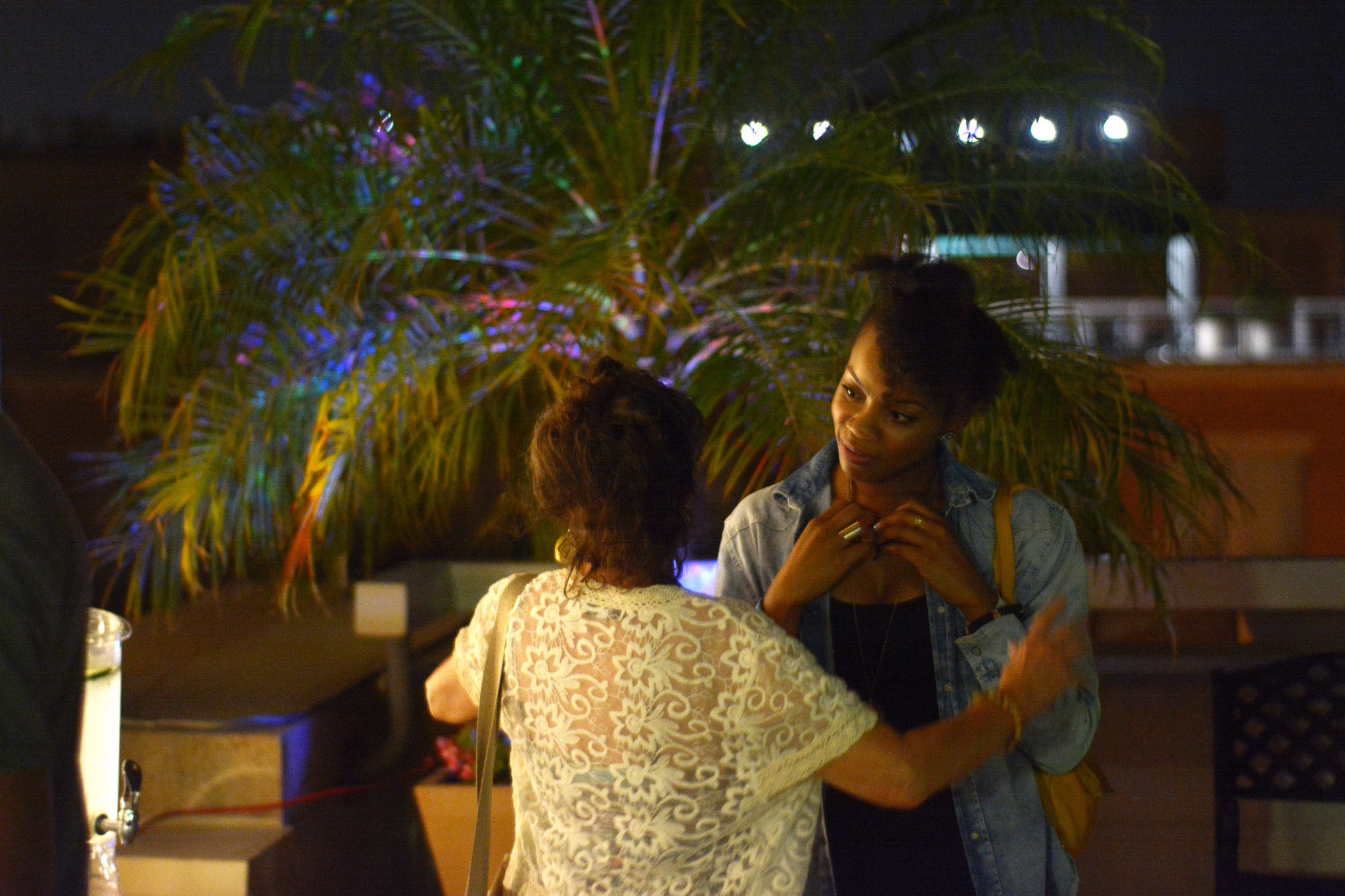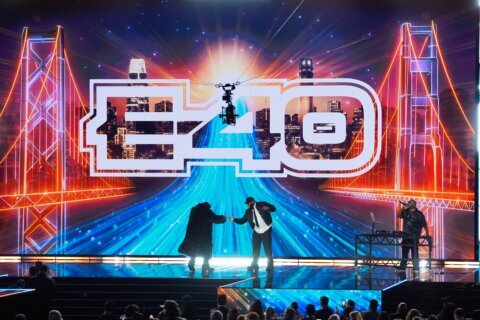WASHINGTON — Clear your calendars! It’s that time again.
The 13th annual D.C. Shorts Film Festival & Screenplay Competition returns now through Sept. 18.
“You gotta come,” festival director Joe Bilancio told WTOP. “It’s film, it’s food, it’s fun, it’s drink, it’s merriment, watching films with your best buddies or your new best friends.”
Festival founder Jon Gann, who built the event into the “World’s Coolest Short Film Fest” by MovieMaker Magazine, hands the reins to Bilancio, who spent 16 years at the Rehoboth Beach Independent Film Festival, not to mention running the DC Shorts WINS festival earlier this year.
“It’s been a really easy transition,” Bilancio said. “Part of that is the core [group] is still around. Paul Marengo and Kimberley Bush … and I go way back when we worked with Reel Affirmations and other film organizations here in the area. Derek Horne is a professional in the film festival world, so he stepped right in. Together, Derek and I took over the programming, while Kimberley and Paul continue to do what they do to make sure the event and the associated ancillary events happen.”
This year’s festival received 1,348 entries from around the world — ranging from the U.S. to Senegal, France to Germany — which were then pared down to 131 films to screen at this year’s festival.
“There really is something for everyone,” Bilancio said. “We try to make our showcases so they’re a blend of humor, seriousness, documentaries, animation. We really do try and make it so that those who are film festival fans really get the breadth, but more importantly, it’s the people who say, ‘I don’t think I like short films,’ … we try and give them a good representation of what a short film can be.”
With numerous short films grouped together in 90-minute blocks, the 14 showcases will screen at E Street Cinema, U.S. Navy Memorial and Atlas Performing Arts Center on H Street Northeast.
“As we were putting together the program, we thought there were a lot of similar themes,” Bilancio said. “They all have themes: ‘Life is a Journey Not a Race,’ where all the films relate to living life; ‘Slightly Sexy,’ which are maybe a bit risqué … although if you’re 15 you’re not gonna be freaked out by any of those; ‘Express Yourself,’ shifting perspectives of how we look at things. … We’re excited about people’s interpretation after they see the films and how they think they relate to the topic.”
What sorts of films can you expect this year? Here’s a cross-genre sampling:
‘Pickle’
“Pickle is a fish who can’t swim, so Pickle lives in a sponge standing up his whole life,” Bilancio said. “This is a story of two people who just love animals and take in stray animals who all die, but often die a really bizarre death. … At first you’re going, ‘Is this a mockumentary?’ … Then after about the 12th animal that meets his demise, you’re laughing out loud, but you’re taken by the story of these two wonderful people who just continue to have devastation yet get complete joy out of what they do.”
‘Where We Begin’
“We have a couple of films that deal with Alzheimer’s and memory loss, which theoretically you think, ‘Oh my god, this is gonna be such a bummer,’ but they’re so well done and so uplifting,” Bilancio said. “One is called ‘Where We Begin’ and it’s done through dance. It’s just this beautiful portrait of somebody going through this process and the loved ones around it that’s just phenomenal.”
‘Fragile Storm’
“Another one called ‘Fragile Storm’ takes a different look, where you’re not really sure what’s happening, and then slowly the story unfolds to be something that your mind probably never went there to begin with,” Bilancio said. “We have a lot of those films where I call them genre-bending or genre twists where they start out one thing [and end another].”
‘Get the F**K out of Paris’
“That’s in our technology addiction program, which talks about the way in which we interpret text [messages],” Bilancio said. “It’s this wild ride through mixed messages via text.”
‘Balcony’
“‘Balcony’ is a film from the U.K.,” Bilancio said. “I think we’ve seen the reason for the story before — the underserved, tenement projects, the working class in the U.K. — and how one girl refuses to be taken into that environment and creates a world of her own that is just a very special world.”
‘My Aleppo’
There’s also the Syrian doc “My Aleppo,” answering the recent political question, “What is Aleppo?”
If you’re worried about missing the festival’s top films, be sure to check out the “Best Of” slate on Saturday, Sept. 17 and Sunday, Sept. 18 at the Atlas Performing Arts Center and U.S. Navy Memorial.
“These were the things that were deemed to be ‘the best of,’ the cream of the crop,” Bilancio said.
You can also go online and watch about 75 of this year’s entries, as well as films from past years.
“If you’re traveling or you can’t otherwise watch these films the same time-frame as the festival, you can go online and watch,” Bilancio said. “We like to say part of the experience is being elbow-to-elbow with people … but we realize that’s not a possibility for a lot of people. We found this is a really good way to show the viability of short films; show how great short films can be without having to be here.”
After you check out the movies, stick around for the annual screenplay competition on Friday, Sept. 16 at the U.S. Navy Memorial. After reading more than 100 entries, D.C. Shorts will host live table readings of the six finalist scripts, each clocking in at roughly 15 pages (i.e. 15-minute short films).
“If you’re an actor, you can go to our website and look for our casting notice because we’re actually casting the live table readings,” Bilancio said. “There’s a 10 o’clock audition, then they rehearse, then come back that night to do the table reads. We do six live table readings. If you’ve never been to a table reading, it’s a phenomenal way to see something because you’re paying attention to the words.”
The winner of the script competition gets $1,000 up front and another $1,000 to be used for post-production, as well as special consideration to screen at a future festival upon completion.
“We’re so excited when a film that is being made from the screenplay competition actually is finished and comes back to us,” Bilancio said.
Whether you’re watching the film screenings or participating in the script competition, the entire festival is a great networking opportunity for aspiring filmmakers, film critics and film lovers.
“We have film and filmmaking seminars, things for filmmakers like camerawork and lighting, but also if you’re an aspiring film critic … we have a panel for that with people from the [Washington Area Film Critics Association],” Bilancio said. “We have a lot of filmmakers who come into town from all over the world, so they’ll do a Q&A [after the screenings] or you can get to a party and meet them.”

These parties include private events — from the welcome reception to the awards brunches — as well as public bashes, including “Viva Hispanica!” on The Rooftop at Carroll Square and “Confetti: The DC Shorts Closing Reception,” hosted from 7-10 p.m. on Saturday, Sept. 17 at the U.S. Navy Memorial.
Tickets vary depending on how many events you attend. If you want to hit all the films and parties, the “All-Access Pass” costs $125. Or, you can attend the individual screenings at $12 per ticket.
“The all-access pass is literally like your V.I.P.,” Bilancio said. “You get to see everything, you get in early, you get a T-shirt, you get a nice swag bag. That really gets you in everywhere.”
Regardless of how you do it, whether it’s piecemeal or all encompassing, it’s important to get out to DC Shorts to contribute to the ever-growing creative community here in our nation’s capital.
“It’s a crazy, vibrant town that I don’t think people realize,” Bilancio said. “They still think of us as a politically stuffy environment and that is not the case and hasn’t been for a while. … It’s not only necessarily filmmakers and screenwriters, it’s live theater and people who are doing fine art. These are all people contributing to making D.C. the culturally vibrant city that it is. … We really want the creative economy to succeed because the festival succeeds, but it really is bettering our society.”
Click here for more information. Listen to the full conversation with festival director Joe Bilancio below:








